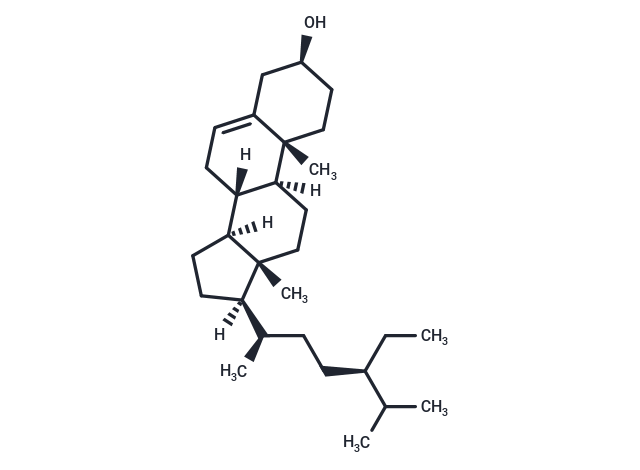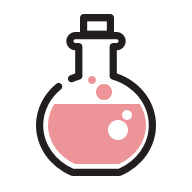- Remove All
 Your shopping cart is currently empty
Your shopping cart is currently empty
Shopping Cart
Beta-Sitosterol
Catalog No. T2966Cas No. 83-46-5
Alias β-Sitosterol, SKF 14463, Cupreol, Beta-Sitosterol, Betaprost, Azuprostat, 22,23-Dihydrostigmasterol
Beta-Sitosterol (SKF 14463) has recently been shown to induce G2/M arrest, endoreduplication, and apoptosis through the Bcl-2 and PI3K/Akt signaling pathways. Beta-Sitosterol (SKF 14463) , a main dietary phytosterol found in plants, may have the potential for prevention and therapy for human cancer. Although the exact mechanism of action of Beta-Sitosterol (SKF 14463) is unknown, it may be related to cholesterol metabolism or anti-inflammatory effects (via interference with prostaglandin metabolism). Beta-Sitosterol (SKF 14463) induces apoptosis and activates key caspases in MDA-MB-231 human breast cancer cells.

Beta-Sitosterol
Catalog No. T2966Alias β-Sitosterol, SKF 14463, Cupreol, Beta-Sitosterol, Betaprost, Azuprostat, 22,23-DihydrostigmasterolCas No. 83-46-5
Beta-Sitosterol (SKF 14463) has recently been shown to induce G2/M arrest, endoreduplication, and apoptosis through the Bcl-2 and PI3K/Akt signaling pathways. Beta-Sitosterol (SKF 14463) , a main dietary phytosterol found in plants, may have the potential for prevention and therapy for human cancer. Although the exact mechanism of action of Beta-Sitosterol (SKF 14463) is unknown, it may be related to cholesterol metabolism or anti-inflammatory effects (via interference with prostaglandin metabolism). Beta-Sitosterol (SKF 14463) induces apoptosis and activates key caspases in MDA-MB-231 human breast cancer cells.
| Pack Size | Price | Availability | Quantity |
|---|---|---|---|
| 20 mg | $60 | In Stock | |
| 100 mg | $200 | In Stock |
Bulk & Custom
Add to Cart
Questions
View MoreSelect Batch
Purity:99.95%
Contact us for more batch information
All TargetMol products are for research purposes only and cannot be used for human consumption. We do not provide products or services to individuals. Please comply with the intended use and do not use TargetMol products for any other purpose.Product Introduction
Bioactivity
Chemical Properties
| Description | Beta-Sitosterol (SKF 14463) has recently been shown to induce G2/M arrest, endoreduplication, and apoptosis through the Bcl-2 and PI3K/Akt signaling pathways. Beta-Sitosterol (SKF 14463) , a main dietary phytosterol found in plants, may have the potential for prevention and therapy for human cancer. Although the exact mechanism of action of Beta-Sitosterol (SKF 14463) is unknown, it may be related to cholesterol metabolism or anti-inflammatory effects (via interference with prostaglandin metabolism). Beta-Sitosterol (SKF 14463) induces apoptosis and activates key caspases in MDA-MB-231 human breast cancer cells. |
| In vitro | Bioactivity-guided isolation from the hexane fraction of E. indica yielded Beta-Sitosterol (β-sitosterol), Stigmasterol, and Lutein. Beta-Sitosterol and Stigmasterol displayed minimal PPL inhibition, with 2.99±0.80% and 2.68±0.38% at 100 μg/mL (242-243 μM) respectively, compared to higher inhibition by Curcumin (IC50=4.92±0.21 μg/mL) and Quercetin (IC50=18.60±0.86 μg/mL). These compounds showed weaker inhibition than literature values (50% PPL inhibition at 100 μg/mL). Beta-Sitosterol, also extracted from Aloe vera, inhibits the growth of L. donovani promastigotes, implicated in visceral leishmaniasis. |
| In vivo | Beta-sitosterol (β-sitosterol) treatment significantly reduced immobility times in mice across all doses tested (10, 20, and 30 mg/kg) in both the Forced Swim Test (FST) and Tail Suspension Test (TST), indicating a notable antidepressant effect. At 30 mg/kg, β-sitosterol's efficacy was comparable to fluoxetine (20 mg/kg) with the most robust effect against the control group (P < 0.001). The percentage decreases in immobility (DID) for FST were 39.27%, 51.23%, and 57.48% for 10, 20, and 30 mg/kg respectively, and for TST were 31.63%, 43.95%, and 53.38% for the same doses, confirming the dose-dependent antidepressant activity of Beta-sitosterol in animal models. |
| Alias | β-Sitosterol, SKF 14463, Cupreol, Beta-Sitosterol, Betaprost, Azuprostat, 22,23-Dihydrostigmasterol |
| Molecular Weight | 414.71 |
| Formula | C29H50O |
| Cas No. | 83-46-5 |
| Smiles | C[C@@]12[C@]([C@]3([C@@]([C@]4(C)C(=CC3)C[C@@H](O)CC4)(CC1)[H])[H])(CC[C@@]2([C@@H](CC[C@H](C(C)C)CC)C)[H])[H] |
| Relative Density. | 0.9540 g/cm3 (Estimated) |
Storage & Solubility Information
| Storage | Powder: -20°C for 3 years | In solvent: -80°C for 1 year | Shipping with blue ice. | |||||||||||||||
| Solubility Information | Ethanol: 3.32 mg/mL (8 mM), Sonication is recommended. DMSO: Insoluble | |||||||||||||||
Solution Preparation Table | ||||||||||||||||
Ethanol
| ||||||||||||||||
Calculator
In Vivo Formulation Calculator (Clear solution)
Please enter your animal experiment information in the following box and click Calculate to obtain the mother liquor preparation method and in vivo formula preparation method:
Mother liquor preparation method: 2 mg of drug dissolved in 50 μL DMSO (mother liquor concentration of 40 mg/mL), if you need to configure a concentration that exceeds the solubility of the product, please contact us first.
(mother liquor concentration of 40 mg/mL), if you need to configure a concentration that exceeds the solubility of the product, please contact us first.
Preparation method for in vivo formula: Take 50 μL DMSO main solution, add 300 μLPEG300
main solution, add 300 μLPEG300 mix well and clarify, then add 50 more μL Tween 80, mix well and clarify, then add 600 more μLddH2O
mix well and clarify, then add 50 more μL Tween 80, mix well and clarify, then add 600 more μLddH2O mix well and clarify
mix well and clarify
For Reference Only. Please develop an appropriate dissolution method based on your laboratory animals and route of administration.
Dose Conversion
You can also refer to dose conversion for different animals. More Dose Conversion
Tech Support
Please see Inhibitor Handling Instructions for more frequently ask questions. Topics include: how to prepare stock solutions, how to store products, and cautions on cell-based assays & animal experiments, etc
Keywords
Related Tags: buy Beta-Sitosterol | purchase Beta-Sitosterol | Beta-Sitosterol cost | order Beta-Sitosterol | Beta-Sitosterol chemical structure | Beta-Sitosterol in vivo | Beta-Sitosterol in vitro | Beta-Sitosterol formula | Beta-Sitosterol molecular weight

Copyright © 2015-2025 TargetMol Chemicals Inc. All Rights Reserved.



